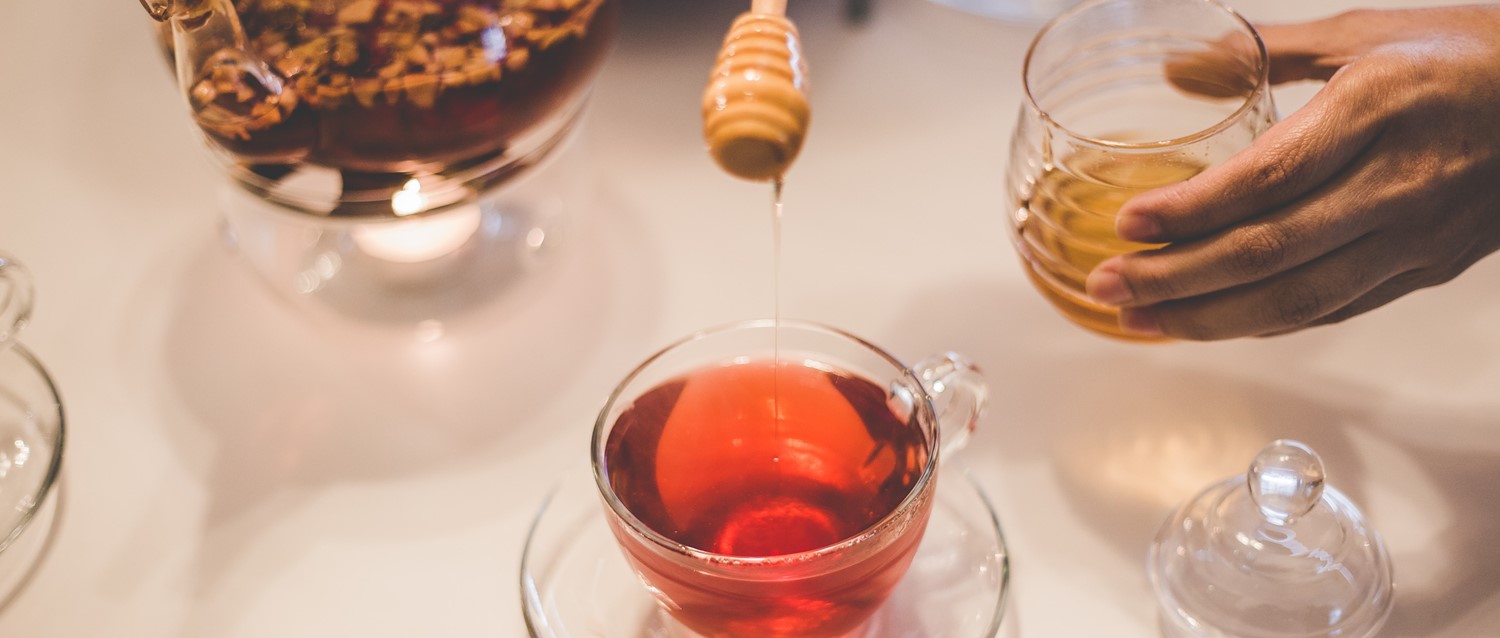
Coughs, colds and sore throats: is honey better than over-the-counter treatments?
Peer reviewed by Dr Sarah Jarvis MBE, FRCGPLast updated by Allie AndersonLast updated 5 Nov 2020
Meets Patient’s editorial guidelines
- DownloadDownload
- Share
- Language
- Discussion
- Audio Version
As winter approaches, you might be tempted to fill your bathroom cabinet with pills and potions to treat the family’s coughs and colds. But according to a new study – as well as centuries of tradition and anecdotal evidence – you may be better off heading to the kitchen and reaching for a jar of honey.
In this article:
Video picks for Throat and tonsils
Most of us have taken all sorts of remedies bought in pharmacies or supermarkets to treat minor winter ailments. In fact, UK consumers spent more than £478 million on cough, cold and sore throat treatments last year, a 6.7% increase compared with the previous year.
This rise could be in part due to guidance published in 2019 by the National Institute of Health and Care Excellence (NICE), advising doctors that in most cases, they shouldn’t prescribe antibiotics for coughs because, other than under very specific circumstances, they don’t improve symptoms.
Furthermore, the guidance stated that as a first port of call, patients should try simple over-the-counter medicines and an old favourite – honey.
According to Sophie Medlin, consultant dietitian and director of CityDietitians, it’s no surprise to see honey recommended for its health benefits. “Honey has been used as a traditional remedy for coughs and colds for centuries,” she says. “It’s known to have antibacterial properties and it also acts as a prebiotic, so it can feed beneficial bacteria in the colon.”
Continue reading below
What the science says
Despite honey’s reputation as a time-honoured home remedy, there has been little research into how effective it really is in treating upper respiratory tract infections (URTIs), which are the most common cause of coughs, colds and sore throats.
A study published recently in the British Medical Journal examined 14 studies comparing honey with 'usual care' for URTIs. Eight studies showed it reduced cough frequency; five that it reduced cough severity; and three that it improved overall symptom score.
Having said that, other studies have shown less impressive results. A 2018 review by Cochrane - a highly regarded independent group of clinicians, scientists and patients - suggests that in children 'Honey probably reduces cough symptoms more than placebo' and that 'There may be little or no difference between the effects of honey and dextromethorphan (an ingredient in over-the-counter cough remedies)'.
Mike Hewitson, a pharmacist in Dorset, regularly recommends home remedies for coughs and sore throats. “The problem with a lot of over-the-counter treatments – things like cough medicines – is that there isn’t an awful lot of evidence to support their use,” he comments. “So, for simple coughs and sore throats I often recommend things like honey and lemon first of all.”
When to treat
Back to contentsOver-the-counter remedies are not harmful if they are taken as directed, and the updated NICE guidance states that some self-care treatments might help to relieve cough symptoms.
As well as honey for adults and children over the age of one, the guidance includes the herbal medicine pelargonium and cough medicines containing either guaifenesin, which helps you to bring up mucus (called an expectorant), or ingredients that suppress the cough. Pelargonium, guaifenesin, and cough suppressants should not be used in children under the age of 12.
Research has found that some treatments have a tangible benefit in treating respiratory tract infections. For example, a German study concluded that pelargonium reduced the severity of acute bronchitis in adult participants, when compared with a placebo. Another found a benefit compared to placebo for people with cold and sinus symptoms.
Other over-the-counter treatments can also provide relief . For example, sucking on lozenges stimulates saliva and lubricates the throat, and they’re convenient too.
In addition, non-steroidal anti-inflammatories (NSAIDs) can bring relief for patients who can take them. “Dispersible aspirin can be used to gargle with to help reduce inflammation associated with a sore throat,” Hewitson says. “If the patient was otherwise well with no history or risk of stomach ulcers, I'd suggest swallowing it but if not, or if they have asthma or take other medication, I'd tell them to spit it out after gargling.”
Medlin adds: “While some people will find comfort from using over the counter medications when they have a cough or cold, the addition of honey is likely to be beneficial. Try a spoonful of honey with a wedge of lemon in warm water.”
Continue reading below
Further advice
Back to contentsCurrently, everyone is on high alert for signs of COVID-19, one of which is a new persistent cough. In coronavirus, it might be accompanied by a temperature and a change in your sense of taste or smell. If you have any of these symptoms you must self-isolate straight away and try to get a COVID-19 test as soon as possible. If you do test positive, honey and other over-the-counter remedies may help to soothe symptoms (but whilst you're self-isolating, ask someone to deliver medication and food to your house to avoid spreading the virus).
If coronavirus has been ruled out, symptoms that have lasted longer than a few weeks should be checked by a doctor. You should also get advice if you’re coughing up blood or green-coloured mucus, or if you have a long-term condition and ongoing cough, cold or flu symptoms. Your GP may offer you a telephone appointment to assess whether you need antibiotics.
Patient picks for Throat and tonsils

Ear, nose and throat
10 common questions about tonsil stones
Tonsil stones aren’t dangerous, but they can be unpleasant and cause problems like bad breath. But why do these deposits build up in the tonsils - and what are they made of?
by Lydia Smith

Ear, nose and throat
Coughs, colds and sore throats: is honey better than over-the-counter treatments?
As winter approaches, you might be tempted to fill your bathroom cabinet with pills and potions to treat the family’s coughs and colds. But according to a new study – as well as centuries of tradition and anecdotal evidence – you may be better off heading to the kitchen and reaching for a jar of honey.
by Allie Anderson
Continue reading below
Article history
The information on this page is peer reviewed by qualified clinicians.
5 Nov 2020 | Latest version

Ask, share, connect.
Browse discussions, ask questions, and share experiences across hundreds of health topics.

Feeling unwell?
Assess your symptoms online for free
Sign up to the Patient newsletter
Your weekly dose of clear, trustworthy health advice - written to help you feel informed, confident and in control.
By subscribing you accept our Privacy Policy. You can unsubscribe at any time. We never sell your data.